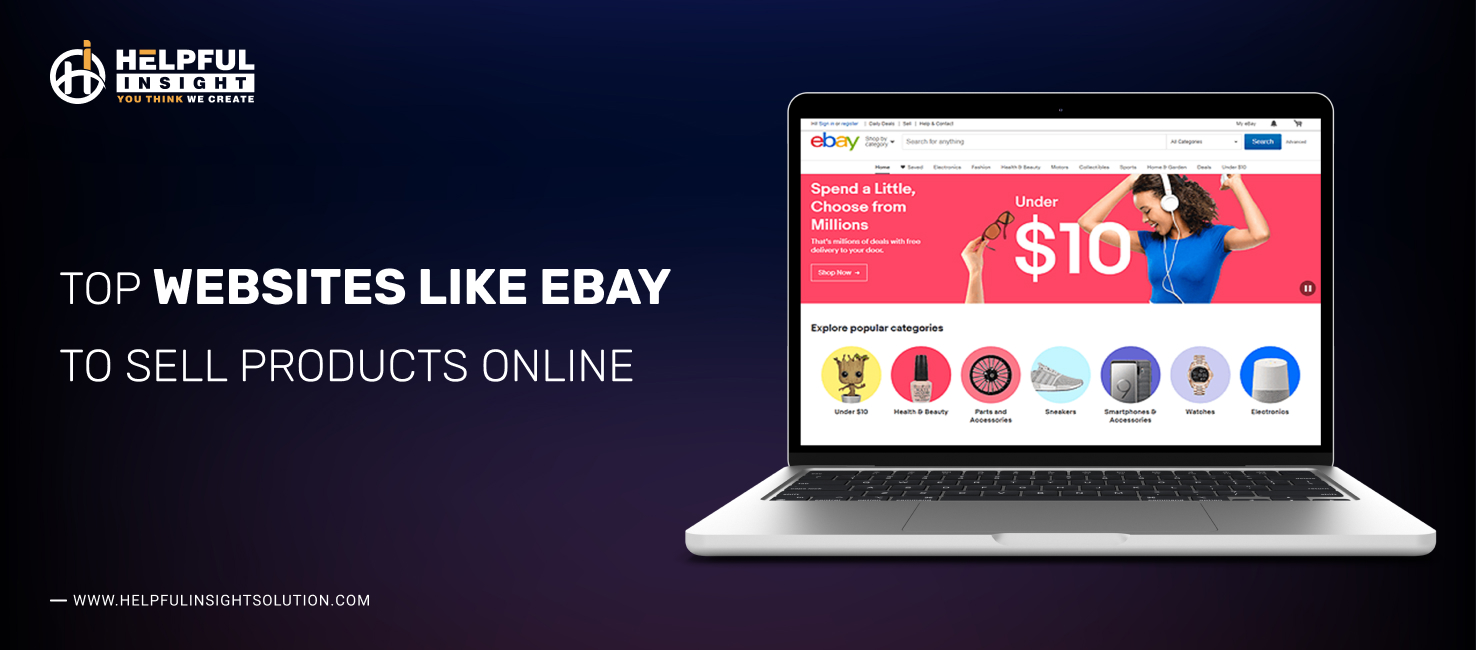eBay has long been the leading force in the e-commerce market. Among all the available similar sites and apps, eBay remained people’s favorite. Unsurprisingly, it cornered 132 million yearly active buyers worldwide and spent $73 billion in transactions in 2023, 48% of which was spent in the United States. The doors of eBay are wide open for customers wanting to purchase or sell goods and also provide other options for people wishing to expand their selling arenas. With endless possibilities for creating individualized marketplaces for niche-specific products to large general e-commerce sites that offer numerous options.
The striking growth and development of global e-commerce sites may leave you bewildered. Ever since 2014, e-commerce sales have increased significantly worldwide by approximately 800%. According to Statista, e-commerce retail sales around the world will reach approximately 4.9 trillion dollars. The U.S. e-commerce industry was worth almost a trillion dollars in around 2023. That figure is about to rise around 50% over the upcoming 4 years to about $ 7.4 trillion by the end of 2025.
In this article, we’ll go through 20 of the best sites like eBay, offering both sellers and customers various venues to present or acquire products and tap unprecedentedly large audiences. Whether you are an artisan with some craft items, a tech nerd with all the latest gadgets, or a closet full of designer labels, there is a marketplace that would cater to your product needs.
What is an Online Marketplace?
An e-marketplace is a virtual network whereby different types of sellers or vendors can enlist as well as offer and sell their goods and services to a group with a wide span of consumers. Such sites are like virtual buildings where goods or services can be exchanged online, creating an electronic market with no need for brick-and-mortar stores. Essentially, the common marketplace functions give vendors an option to list specific goods, accept payments, and create room for communications to make the buying and selling processes simple and easily manageable.
To illustrate, e-commerce Platforms like Amazon, eBay, and Etsy make up this group. They usually feature an eclectic array of tenants, ensuring customers a great chance to find a vast array of items from various categories. Online Retail Platforms have changed the landscape of business by giving vast market access that is convenient for both small and big-size businesses to get global exposure and for consumers to locate everything they need depending on budget, location, policies, and other important factors.
It’s better to come up with some original and best web app ideas if you want to create a new online marketplace in order to attract visitors.
What is eBay?
eBay is an eCommerce platform that was created and launched by Pierre Omidyar in 1995 and is currently one of the largest online marketplaces around the globe. It works as a Selling Platform that establishes a link between consumers and sellers worldwide, stimulating both sellers and buyers, tokens, while offering a wide variety of products and categories. eBay provides people and companies with optional platforms to post new or used goods and items for sale through online bidding or pricing methods acting as Auction Sites on eBay. People can shop there for items, place bids, or complete the purchases without late shopping seasons and sometimes the prices are lower than brand stores.
The eCommerce Sites gives vendors access to a control panel where they can create, edit, and manage their listings, conclude deals, and negotiate with clients. eBay rates its marketplace banus against the feedback system which makes senders and collectors give each other a review based on their experience of working with one another. Through the years eBay had many functions, which can’t be limited to the electronic car sales and the eBay classified portion. It still is a popular site for both consumers and companies that are involved in the buying and selling of goods online, dealing with a high volume and variety of goods and other business transactions in an active and vibrant marketplace.
20 Best Websites Like eBay – Alternatives to Buy & Sell Products Online
If you are looking for eBay alternatives for buying and selling products, then you’ve arrived at the right place. We have come up with a list of the 20 best websites like eBay that cater to various needs and preferences of customers. Let’s take a look at these eBay alternatives along with other factors:
|
Platform Name |
Key Features |
Best For |
Specialty |
|---|---|---|---|
| Vast product variety, Prime membership benefits | General goods | Global e-commerce leader | |
| Handmade and vintage items, customizable products | Crafts and creative goods | Niche marketplace for artisans | |
| Easy setup, no listing fees | Unique and niche items | Seller-focused platform | |
| Specialized in tech and electronics | Tech and gaming enthusiasts | Electronics and gadgets | |
| Cashback offers, global marketplace | General goods | Customer loyalty programs | |
| Large customer base, trusted retailer | General goods | Association with Walmart brand | |
| Local buying and selling, easy to use | Local buyers and sellers | Community-based trading | |
| Discounted home goods and furniture | Home and lifestyle items | Overstock and surplus items | |
| Wholesale pricing, global shipping | Affordable bulk items | Chinese supplier connections | |
| Local classifieds, job postings | Local and second-hand items | Direct person-to-person interactions | |
| Designer and luxury clothing | Fashion enthusiasts | Second-hand luxury fashion | |
| Closet resale, user-friendly app | Pre-owned fashion | Community-driven buying/selling | |
| Easy listing, fast shipping options | General second-hand items | User-friendly mobile app | |
| Antiques, collectibles, and art | Collectors and antique lovers | High-quality vintage items | |
| Local deals, no fees for buyers | Local buyers and sellers | Mobile-first selling experience | |
| Local yard sale-style marketplace | Family-oriented sales | Community-centric platform | |
| Low-cost items, direct from manufacturers | Budget-conscious buyers | Bargain-focused platform | |
| Seamless integration with stores | General goods | Trusted retailer with in-store pickup | |
| Fashion and footwear | Clothing and accessories | European fashion hub | |
| Independent brands, creative goods | Indie and small-business products | Supporting small businesses |
1. Amazon

Amazon is rather the biggest online marketplace operating in 20+ countries with over 300+ active consumers, which has favorable options such as rapid shipping to competitors like eBay. As of now, Amazon has over 50Cr+ downloads and 4.0-star ratings on the Play Store. Sellers get a chance to grab a worldwide potential client across several classifications, while buyers are reaping the benefits of low prices and prime shipping; websites like Amazon are the most popular and best alternative to the eBay marketplace.
Amazon has long dominated the e-commerce market as the world’s favorite online marketplace. In 2022, the company hit over half a trillion U.S. dollars in net sales. The United States is by far Amazon’s most profitable market, as the U.S. branch generated over 365 billion U.S . dollars in sales in 2022. Germany ranked second, with 33 billion dollars, followed closely by the United Kingdom with 30 billion dollars.
Amazon offers a wide array of features, including:
- Vast Product Selection: Amazon offers the choice considering the line of products grouped under so many categories.
- Quick Shipping: For Prime members, fast and convenient shipping options are the main advantage.
- Reviews and Ratings: Users might get exact product reviews and ratings, allowing them to make the right choice before purchasing.
- One-Click Ordering: Shortening the payment process and providing fast purchases.
- Subscribe & Save: Automatically reorder the standard items and offer discounts to customers.
- Amazon Prime Video: Movie and TV title streaming site that has a huge selection of movies and TV shows and doesn’t involve paid ads like traditional cable.
Pros:
- Vast Selection: Amazon not only has a wide range of products but also the possibility to order even books from there.
- Convenience: Brand provides online shopping that is convenient and only takes a short time to get to you.
- Competitive Pricing: Many popular items are sold at a discount and money can be saved.
- Prime Membership: Among the privileges of membership we offer are a warm welcome and free shipping and streaming.
Cons:
- Counterfeit Products: The risk of vendors selling items that are replicas or low quality is there.
- Dependency: Equaling the fame of the local businesses as well as the vast usage of Amazon leads to the problem of local businesses.
2. Etsy
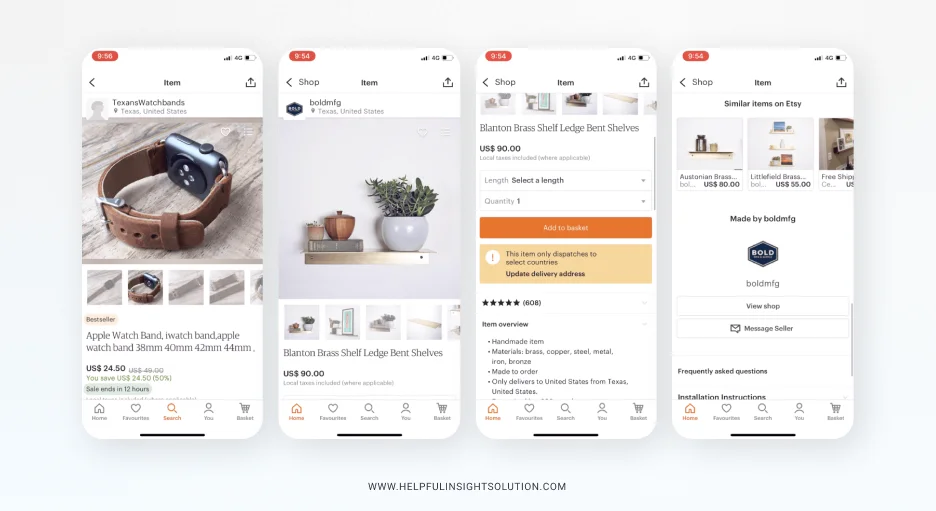
With its focus on handmade, vintage, and one-of-a-kind goods that could often be hard to find elsewhere, the Etsy online marketplace is declaring its niche corner for handmade and vintage crafters. Through the community-centeredness of its product offerings and the fact that it specifically searches for unique items, shoppers who are on the lookout for something very special are always accommodated.
There are so many entrepreneurs things to develop websites like Etsy for starting a great business venture. Etsy generated a yearly revenue increase of US$2.75 billion in 2023-2024 and registered a net gain of $308 million, which is expected to rise even further in the next financial year.
Etsy offers unique features tailored for artisans and crafters:
- Handmade Goods: An online store featuring homemade, second-hand, and one-off merchandise.
- Seller Tools: A solution that offers the sellers instruments and aspects on how to manage stores effectively. Use our artificial intelligence (AI) tools to evaluate your text.
- Customization: From the buyer’s perspective, these choices reflect their unique personality or preferences.
- Community Engagement: A variety market spearheads a vivid community for buyers and sellers, with interaction and support being the uncanny links for success.
- Search Filters: Specific filters designed for second-hand, vintage, and handcrafted stuff can be used to have the products browsed with ease.
- Direct Communication: System of communication that can be direct between consumers and suppliers for customized ordering and personalized requests.
Pros:
- Handmade Goods: Specific marketplace for homemade, vintage, and crafts products. Create a customized plan to address this additional issue.
- Community: Cooperation, collaboration, and the provision of help will ensure the success of the customers and vendors.
Cons:
- Seller Fees: Commission for listing products on the platform and selling those products also.
- Competition: The existence of too many players in the market can lower deals for customers, presenting strong competition for sellers to stand out.
- Limited Scope: Being only handmade crafts, vintage, and once-off products we can only get a few of them at a time this way to master limited variety.
3. Bonanza

Bonanza is a popular e-commerce platform that focuses on seller-friendly features, offering a vast array of products ranging from fashion to antiques and collectibles. Its flexible policies and easy-to-use tools make it a preferred choice for small businesses and independent sellers. The platform listed over 22 million items available for sale. It operates in over 199 countries. It charges a 3.5% commission on sales (up to $500), with optional advertising tiers for increased visibility.
Bonanza offers distinctive features tailored for sellers:
- Seller-Friendly Policies: Policies that encourage and help the sellers to feel comfortable and provide low fees along with customizable listings are among the policies of this platform.
- Broad Product Range: The selection of products ranging from opposite ends of the spectrum that include antiques, collectibles, fashion, and home goods among others.
- Google Shopping Integration: In Google Shopping, integration of the shopping will be seamless leading to increased product visibility and reach.
- Import Tools: This process can be greatly accelerated by providing tools like directly importing listings from other channels (e.g. eBay).
- Community Support: We have found a welcoming community of sellers who are all willing to give advice and helping hands.
- Bonanza Advertising: It also provides space for brand advertisement, to increase product awareness and sales.
Pros:
- Seller-Friendly Policies: Cheap listings and seller parts setting options provide the latter advantages.
- Diverse Product Range: A vast selection of products including antiques and collector pieces as well as fashion and home decor.
Cons:
- Limited Brand Recognition: The fact that it has gained more popularity and preferability makes it overshadow the popular giant marketplace sites like eBay or Amazon.
- Competition: Rivals bid for the buyers’ attention which could block the reach of buyers.
- Buyer Reach: A customer base that is a lot smaller than the larger market players have.
4. Newegg
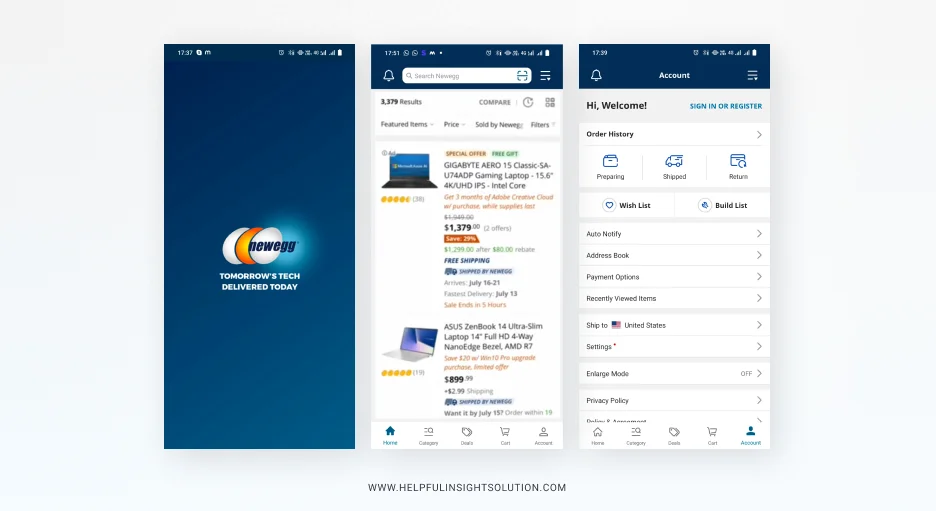
Newegg is a leading e-commerce platform catering to tech enthusiasts, offering gadgets, electronics, and other tech products at competitive prices. It also provides a marketplace for third-party sellers, creating a vibrant tech-focused ecosystem. It has over 10.5 million tech-related items, including laptops, GPUs, and accessories.
It serves customers in over 50 countries. When it comes to user demographics, there are over 32 million tech-savvy buyers annually. The platform launched JustGPU.com in July 2022, dedicated to researching and purchasing graphics cards. It has a strong presence among tech enthusiasts who share reviews and insights.
Newegg has amazing features such as:
- Product Selection: Lots of tech stuff, like computers and electronics.
- Competitive Pricing: good prices and deals on lots of different things.
- Tech Review: of products to help with buying decisions.
- Marketplace Platforms: A place for people to sell their things.
Pros:
- Extensive Product Selection: Big selection of electronics and computer stuff. Tech has changed so much in the last 15 years, it’s part of our lives now.
- Competitive Pricing: Good prices and deals for tech. Phones have changed how people live in places like Uganda.
Cons:
- Customer Service: Some people have had problems with customer service.
- Shipping Delay: The shipping can be slow sometimes.
- Limited Categories: There aren’t a lot of choices for things besides tech stuff.
5. Rakuten
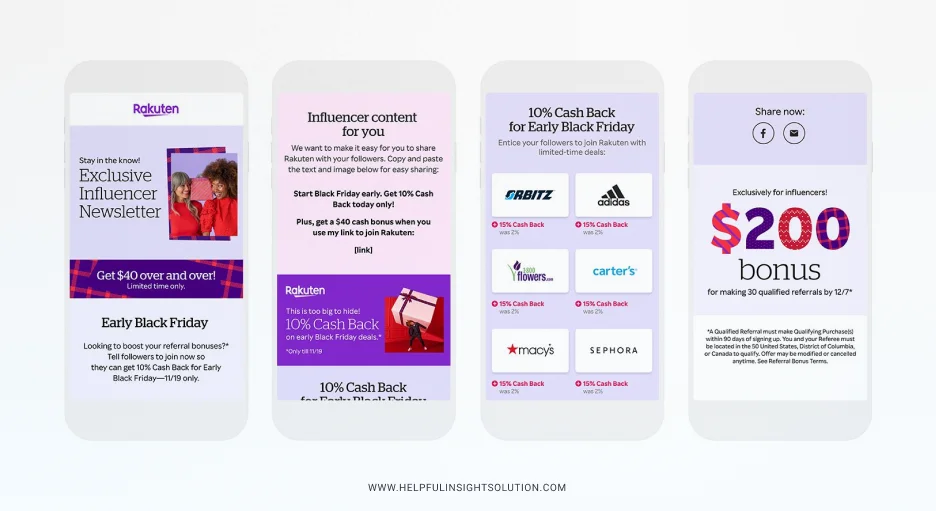
Rakuten, a global e-commerce and cashback platform, connects buyers with over 3,500 retailers worldwide. The platform offers cashback rewards for purchases across a variety of categories, such as fashion, electronics, travel, and more. Since its inception, Rakuten claims to have paid out over $2 billion in cashback rewards to its users. The company operates in over 30 countries and includes more than 3,500 retailers. It has a user base of over 15 million active users in the United States alone.
Rakuten offers a variety of features for both buyers and sellers:
- Cashback Rewards: It gives you rebates on your purchases made via the website.
- Wide Product Range: The site carries many different items across various groups such as gadgets, clothes, and furniture.
- Rakuten Points: These points are obtained whenever someone buys something using their cards which they can later redeem for discounts or other good things.
- Marketplace Platform: It allows other vendors to list their products thereby increasing the product range available
- Member Benefits: There are special promotions only for those who belong to this group.
- Rakuten Mobile: Convenient shopping app used anywhere through your mobile device.
Pros:
- Cashback Rewards: It gives you rebates on your purchases made via the website.
- Wide Product Range: Many different products in different categories.
Cons:
- Limited Brand Recognition: Not being as recognized as bigger e-commerce platforms.
- Shipping Times: Some competitors have faster shipping times than them.
- Limited Membership Benefits: They may not have extensive privileges.
6. Walmart Marketplace
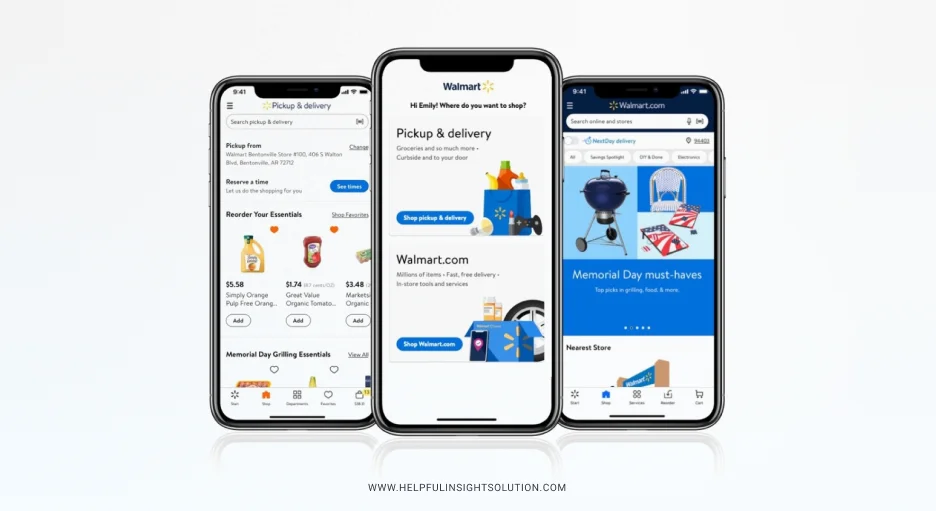
Walmart allows third-party sellers to sell their products on the e-commerce platform directly without involving other parties. It came into existence on July 2, 1962, and ever since it’s been people’s favorite e-commerce platform for buying and selling goods. It offers sellers a direct connection to the Walmart network, with the advantage of the company’s established name and people’s trust.
Walmart has 255 million members and customers worldwide who shop every week, both in-person and online.
Walmart Marketplace offers key features for sellers and buyers:
- Huge Customer Base: Gain access to Walmart’s large audience, which consists of more than 120 million monthly visitors, offering tremendous exposure.
- Two-Day Delivery Badge: To draw clients, qualified vendors can display their goods with a two-day delivery badge.
- Smooth Integration: Facilitates integration with a range of external platforms and solutions for order fulfillment and inventory management.
- Walmart Fulfillment Services (WFS): Like Amazon FBA, Walmart Fulfillment Services (WFS) enables sellers to store, ship, and manage returns via Walmart’s fulfillment centers.
- Sponsored Ads: To increase product visibility, sellers can use Walmart Connect for tailored advertising.
Pros:
- Wide Reach: Leverages Walmart’s established customer base and brand loyalty.
- Low Competition: Compared to Amazon and eBay, Walmart Marketplace has fewer sellers, making it easier to stand out.
- User-Friendly Interface: Simple setup and seller management tools.
- Growth Opportunities: Exposure to international customers through Walmart’s global expansion plans.
- Affordable Fees: No monthly subscription fee, only a referral fee per sale (ranging from 6% to 20% depending on the product category).
Cons:
- Strict Approval Process: Sellers must meet Walmart’s high standards, making the application process competitive.
- Limited Categories: Not all product categories are supported, restricting some sellers.
- Performance Requirements: Sellers need to maintain strict performance metrics, including fast shipping times and excellent customer service.
- Dependence on Walmart Policies: Sellers must adhere to Walmart’s pricing, return, and operational policies, which can limit flexibility.
7. Facebook Marketplace
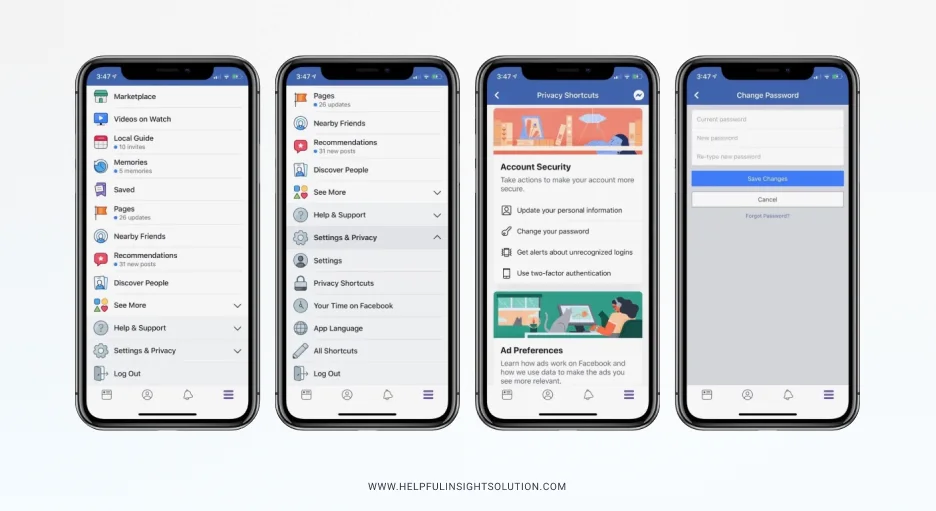
Facebook Marketplace is a feature integrated into Facebook’s platform, allowing users to buy, sell, or trade items locally within their communities. With a user base of over 2.96 billion active monthly users, it leverages Facebook’s massive reach to connect buyers and sellers efficiently. The platform is accessible in over 100 countries, and over 1 billion people use Facebook Marketplace monthly. It includes items like furniture, vehicles, electronics, and rental properties.
Facebook Marketplace offers intuitive features for local buying and selling:
- Local Discovery: Easily browse and discover items for sale in your local area.
- Direct Communication: Communicate directly with sellers via Facebook Messenger.
- Wide Variety: Find a diverse range of items including furniture, electronics, and clothing.
- Seller Verification: Profiles and reviews help verify the credibility of sellers.
- Easy Listing: Simple listing process with photo uploads and descriptions.
- Social Integration: Share listings with friends and family on Facebook for increased visibility.
Pros:
- Local Buying and Selling: Convenient platform for local transactions within communities.
- Direct Communication: Ability to communicate directly with buyers or sellers via Facebook Messenger.
Cons:
- Lack of Buyer Protection: Limited buyer protection compared to other e-commerce platforms.
- Scams and Fraud: Potential for scams and fraudulent transactions due to lack of stringent verification processes.
- Limited Payment Options: Limited payment options are available for transactions.
8. Overstock

Overstock is a US-based firm founded on April 9, 2024. Overstock is an app that emphasizes quality and value, offering discounted pricing on furniture, home decor, and other items. Its emphasis on handpicked product selections appeals to shoppers looking for trendy yet economical solutions.
This simple app allows you to browse our extensive collection of furniture, décor, jewelry, mattresses, beds, and much more, all at incredibly low prices. Enjoy incredible perks while exploring our diverse selection of high-quality products and new arrivals.
Overstock provides an array of features for buyers seeking quality products at discounted prices:
- Vast Selection: Extensive inventory of furniture, home decor, electronics, and more.
- Discounted Prices: Offers products at discounted rates compared to traditional retail prices.
- Flash Deals: Regularly updated flash sales and promotions for additional savings.
- Customer Reviews: Detailed product reviews and ratings to aid purchasing decisions.
- Club O Rewards: Loyalty program offering rewards on purchases, free shipping, and other benefits.
- Mobile App: Convenient shopping experience with the Overstock mobile app.
Pros:
- Discounted Prices: Offers discounted prices on furniture, home decor, and other goods.
- Quality Products: Provides quality products with an emphasis on value and affordability.
Cons:
- Limited Product Range: This may not offer as extensive a selection as some competitors.
- Shipping Delays: Some users report occasional delays in shipping.
- Returns Process: Returns process may be cumbersome for some users.
9. AliExpress

AliExpress is a China-based online retail site that was started in 2010. It sells a wide range of products, including trinkets, vintage items, jewelry, dolls, artwork, and much more, all at competitive prices. The international shipping choices include buyer protection policies, making it a popular choice for internet customers globally. The website received approximately 2.9 billion visitors annually, never falling below 431 million views per month.
AliExpress operates websites in English, Spanish, Korean, Dutch, French, Italian, German, Polish, Turkish, Portuguese, Indonesian, Russian, Ukrainian, Vietnamese, Japanese, Thai, and other languages.
Ali Express offers a variety of features for buyers seeking affordable products directly from manufacturers:
- Extensive Product Range: A vast selection of products ranging from electronics to fashion and home goods.
- Competitive Pricing: Affordable prices due to direct sales from manufacturers.
- Buyer Protection: Guaranteed refunds and dispute resolution for unsatisfactory purchases.
- Global Shipping: Worldwide shipping options with varying delivery times.
- Coupons and Discounts: Regularly available coupons and discounts for additional savings.
- AliExpress Pocket: Convenient mobile wallet for secure and easy payments.
Pros:
- Affordable Pricing: Offers products at competitive prices due to direct sales from manufacturers.
- Wide Product Range: Extensive selection of products across various categories.
Cons:
- Long Shipping Times: Shipping times can be lengthy, especially for international orders.
- Quality Concerns: Some users report receiving low-quality or counterfeit items.
- Communication Barriers: Language barriers may hinder communication with sellers.
10. Craigslist
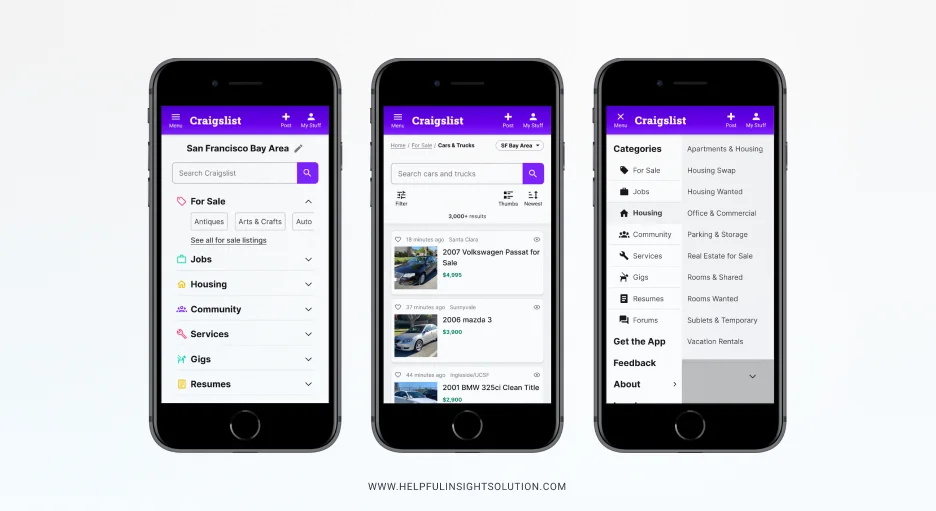
Craigslist (stylized as Craigslist) is one of the most sought-after American-based companies, founded in 1995 in San Francisco, California, U.S. Though it’s an American-based company, it operates in 570 cities in 70 countries, serving as a classified advertisement website with various sections specifically devoted to jobs, items wanted, housing, for sale, services, community service, résumés, and discussion forums. After facing a slight decline in 2020, the site rose again in 2022 and 2023, reaching 694 million U.S. dollars.
Craigslist is well-known for repeatedly refusing to alter the appearance of its website. In 2024, it retains its 1995 barebones design, which became its most identifiable feature. According to Alexa, Craigslist is the #19 most-visited website in the United States in 2022 and ranked #16 in the world in 2023.
Craigslist offers straightforward features for local buying and selling:
- Localized Marketplace: It was organized by city or region, allowing users to buy, sell, or find services within their local area.
- Wide Range of Categories: This site offers listings for jobs, housing, community events, services, items for sale, and more.
- Free Listings: Most postings on this platform are free, except for specific categories like job ads in certain cities.
- Anonymous Communication: It provides an email relay for private communication between buyers and sellers.
- Personals and Community Boards: This platform is for connecting with others through missed connections, volunteer opportunities, or local events.
Pros:
- Cost-Effective: This platform offers free or low-cost postings, making it accessible for individuals and businesses alike.
- Wide Reach: It serves millions of users across various cities and regions globally.
- Quick Transactions: Direct, local connections help facilitate fast sales and exchanges.
- Flexible Communication: An anonymous email relay provides privacy while enabling easy interactions.
Cons:
- Scam Risks: Lack of moderation makes the platform prone to fraudulent listings or scams.
- No Payment or Shipping Integration: Users must handle payment and delivery independently, increasing risks.
- Outdated Design: The basic interface may feel clunky or less user-friendly compared to modern platforms.
- Limited Buyer/Seller Protection: No built-in safeguards for transactions, leaving users to resolve disputes themselves.
- Overwhelming Volume: The sheer number of listings can make finding specific items or services time-consuming.
11. Grailed
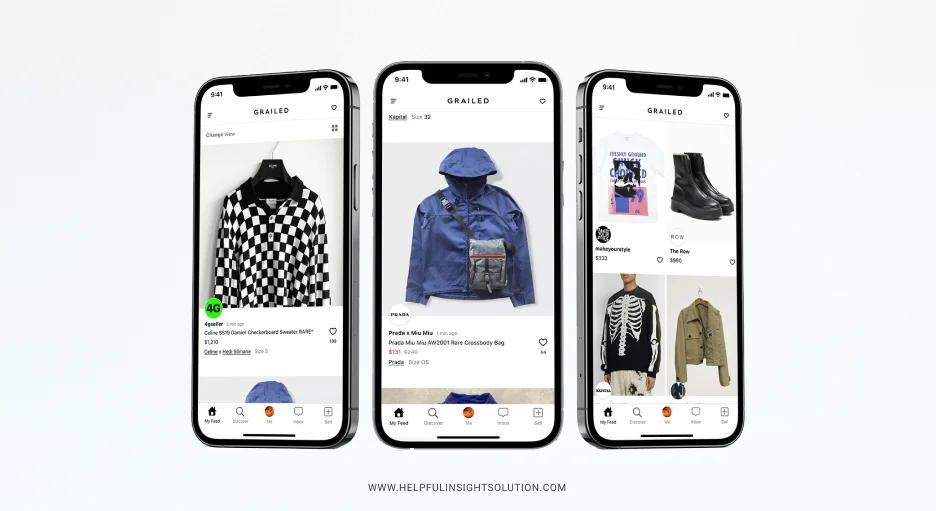
Grailed was founded by Arun Gupta in 2013. The app specializes in streetwear, sneakers, and luxury fashion. Grailed caters to fashion enthusiasts, trendsetters, collectors, and influencers. The community-driven approach and curated marketplace make it a go-to platform for high-end fashion reselling. They allow users to buy, sell, and discover seamlessly.
Buy, sell, and discover. Join Grailed, a reputable personal style network, and connect with a global community of more than 10 million style enthusiasts. Discover curated collections that include millions of menswear and womenswear pieces from over 10,000 designers. Grailed enables you to confidently purchase appealing items, sell pre-loved items from your closet, and discover the most recent trends.
Grailed caters to fashion enthusiasts with unique features:
- Designer Fashion: Curated selection of high-end and luxury fashion items.
- Streetwear Focus: Specializes in streetwear, sneakers, and rare clothing items.
- Seller Verification: Profiles with verification badges ensure credibility and authenticity.
- Buyer Protection: Protection against counterfeit items and unauthorized transactions.
- Personalized Feed: Tailored recommendations based on user preferences and browsing history.
- Community Engagement: Active community forums and discussions on fashion trends and styles.
Pros:
- Specialized Marketplace: Dedicated to streetwear, luxury fashion, and sneakers.
- Authenticity Guarantee: Ensures authenticity of high-end fashion items.
Cons:
- Limited Audience: Targeted towards a specific niche, potentially limiting buyer reach.
- Competition: High competition among sellers may make it challenging to stand out.
- Limited Categories: Focuses primarily on fashion, limiting variety in other product categories.
12. Poshmark

Founded on May 10, 2011, Poshmark is a social commerce marketplace where users can buy and sell new and secondhand fashion, home goods, and electronics. The platform has over 80 million users, with over 200 million available listings, and it generated revenue of US$262 million in 2020.
The company is headquartered in Redwood City, California, with offices in Canada (Vancouver), Australia (Melbourne), and India (Chennai). It prioritizes fashion, and Poshmark allows users to purchase and sell new and used clothing, shoes, and accessories in a social shopping environment. Its emphasis on sharing and engaging fosters a vibrant community of buyers and sellers.
Poshmark offers a social shopping experience with distinctive features:
- Fashion Marketplace: Specializes in buying and selling new and used clothing, shoes, and accessories.
- Social Selling: Users can follow and interact with sellers, fostering a community-driven marketplace.
- Virtual Parties: Live shopping events featuring curated collections and themes.
- Seller Tools: Easy listing process with photo editing tools and customizable listings.
- Offer and Negotiation: Ability to make offers and negotiate prices with sellers.
- Buyer Protection: Guarantee of authenticity and refunds for misrepresented items.
Pros:
- Social Shopping: Engaging platforms with social features for buying and selling fashion items.
- Buyer Protection: Protection against counterfeit items and unauthorized transactions.
Cons:
- Seller Fees: Fees for listing and selling products on the platform.
- Competition: High competition among sellers may make it challenging to attract buyers.
- Limited Scope: Limited to fashion items, potentially limiting product variety.
13. Mercari
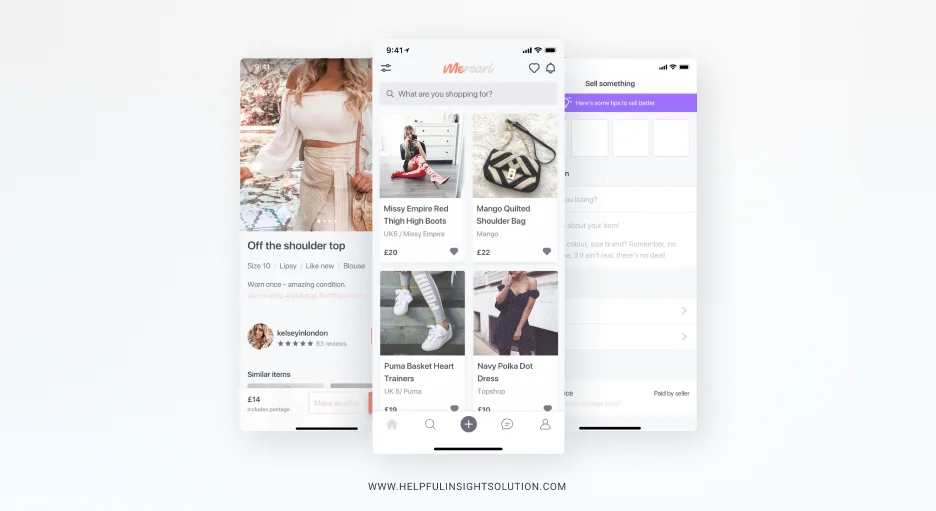
Mercari is one of the best options when it comes to finding eBay alternatives. It is a hub for buying and selling goods from collectibles to groceries to clothes and allows seamless purchase and selling of stuff. The Mercari marketplace app was first launched in Japan in July 2013, and now it has become a giant in the e-commerce marketplace.
They operate in Japan, Taiwan, the United Kingdom, and the United States. Enjoy the ease of reselling with Mercari. With zero selling fees, 1000 new and used items are added to the list every day, and millions of people shop and sell on the Mercari marketplace. The app has a 4.9-star Average App Store app rating and a 4.8-star Average Google Play app rating with 500M+ downloads. Now let’s take a look at its amazing features, pros, and cons.
The marketplace of Marcari includes an amazing set of features like:
- Peer-to-Peer Marketplace: Enables users to buy and sell items directly with others, covering a wide range of categories, including clothing, electronics, and collectibles.
- Simple Listing Process: Selling is easy with the Mercari app—just snap a photo, add details, and set your price.
- Buyer and Seller Protection: Offers secure payment processing and dispute resolution for a safer transaction experience.
- Shipping Options: Provides flexible shipping solutions, including discounted rates and printable shipping labels.
- Promotions and Offers: Sellers can promote listings or offer discounts to attract buyers.
- Saved searches and alerts: Buyers can save searches and get notifications when specific items become available.
Pros:
- Wide Variety of Products: diverse listings, from new to gently used items, across multiple categories.
- Affordable Pricing: Often features lower prices compared to retail stores, making it a budget-friendly option.
- Secure Transactions: Payment protection ensures that funds are released only after buyer satisfaction.
- Local Selling Option: Mercari Local eliminates shipping hassles for buyers and sellers within the same area.
Cons:
- Fees for Sellers: Takes a 10% commission on every sale and additional fees for payment processing.
- Shipping Costs: Sellers may need to cover shipping if not passed onto buyers, which can reduce profits.
- Limited Return Policy: Returns are only accepted under specific conditions, such as item misrepresentation.
- Scams and fake listings: Like other marketplaces, there’s a risk of encountering fraudulent sellers or buyers.
- Customer Service Issues: Some users report delays or difficulties in resolving disputes with Mercari’s support team.
14. Ruby Lane
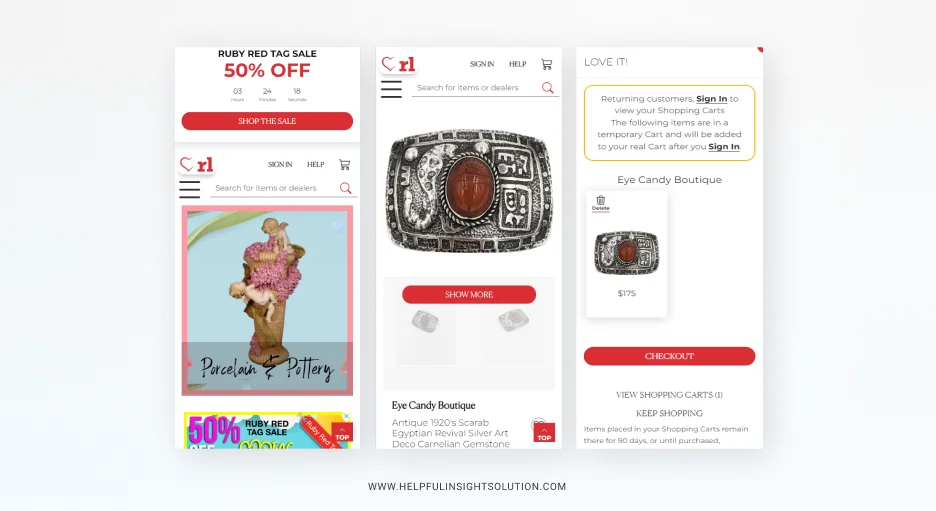
Founded in 1998, Ruby Lane is a vintage online retail store based in San Francisco, California, United States. It specializes in antiques, collectibles, vintage items, jewelry, dolls, and art for sale by independent member sellers. Jewelry accounts for roughly half of the site’s sales. Ruby Lane provides a curated marketplace for discerning buyers and dealers. The website promotes quality over authenticity, making it a reliable resource for antique collectors. In 2019, the site placed second overall. In 2021, the site placed third in the Seller’s Choice award.
Ruby Lane offers unique features for antique and vintage enthusiasts:
- Curated Marketplace: A handpicked selection of antiques, collectibles, and vintage items from trusted sellers.
- Authenticity Guarantee: Assurance of genuine and high-quality products with strict vetting processes.
- Specialty Shops: Specialized shops cater to niche categories, enhancing the browsing experience.
- Personalized Service: Direct communication with sellers and personalized customer support.
- Community Engagement: Active forums and discussions on vintage trends, history, and collections.
- Secure Transactions: Secure payment processing and buyer protection policies for safe transactions.
Pros:
- Curated Marketplace: A handpicked selection of authentic antiques, collectibles, and vintage items.
- Authenticity Guarantee: Assurance of genuine and high-quality products with strict vetting processes.
Cons:
- Limited Audience: Targeted towards a specific niche, potentially limiting buyer reach.
- Competition: High competition among sellers may make it challenging to stand out.
- Limited Categories: Focuses primarily on vintage items, limiting variety in other product categories.
15. OfferUp
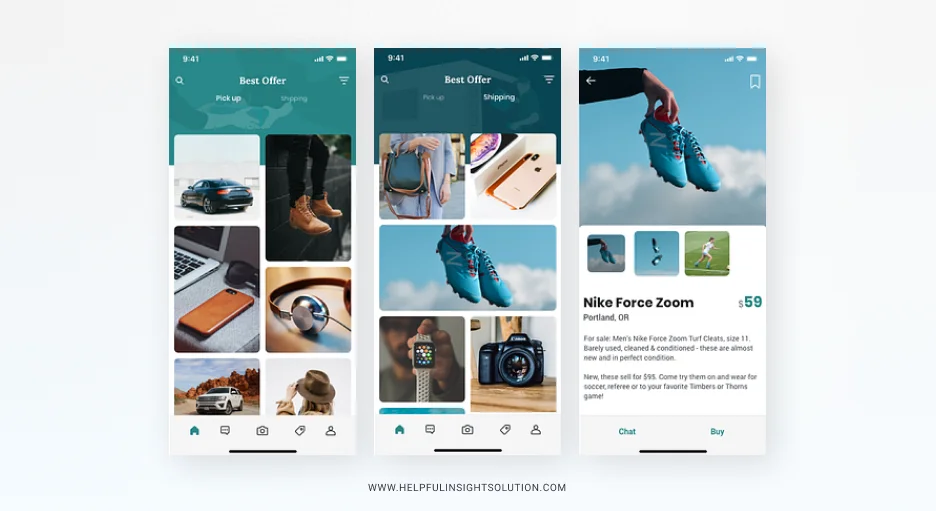
OfferUp is another similar platform to eBay. It is the home of local commerce and connection. We connect more than 150 million local buyers, sellers, businesses, and job seekers in communities across the U.S. through a simple, trusted mobile app. The app facilitates local buying and selling with a mobile-first approach. Its in-app messaging and secure payment options enhance the buying and selling experience for users.
In November 2023, there were roughly 603,000 downloads. OfferUp is a U.S.-based mobile marketplace that facilitates consumer-to-consumer (C2C) trading. The app has 150+ million downloads and 30M annual transactions. In 2016, the company raised $130 million in funding, bringing the company’s total funding to date to more than $221 million. As of December 2022, total funding raised is $381 million.
OfferUp provides convenient features for local buying and selling:
- Local Marketplace: Browse and list items for sale within your community.
- User-Friendly Interface: Easy-to-use platform for listing items and communicating with buyers.
- In-App Messaging: Direct messaging feature for seamless communication between buyers and sellers.
- Secure Payments: Payment processing and transaction protection for safe exchanges.
- Search Filters: Customizable filters to refine search results and find specific items.
- Mobile App: Accessible platform with a mobile app for convenient shopping and selling on the go.
Pros:
- Local Marketplace: Convenient platform for buying and selling items within local communities.
- User-Friendly Interface: Easy-to-use platform for listing items and communicating with buyers.
Cons:
- Limited Buyer Protection: Limited protection against scams compared to other e-commerce platforms.
- Lack of Brand Recognition: Less recognized compared to larger marketplaces like eBay or Amazon.
- Limited Product Range: Focuses primarily on local transactions, potentially limiting product variety.
16. Bookoo
Bookoo is a local free store to purchase and sell stuff from your neighbors. The setup is quite similar to Craigslist, but more local (just your community), and more family-friendly. The app was launched on the Play Store on 22 Jun 2017 and as of now, it has 100,000+ downloads. The app recently got an upgrade on 10, Oct, 2024.
The simplicity and lack of listing fees make the platform even more accessible for both casual sellers and buyers. Besides all that, the layout and design of the UI on Bookoo are impressive as well. The customer support provided by Bookoo is unbeatable. They cater to their customers with utmost devotion.
Bookoo offers straightforward features for local buying and selling:
- Local Classifieds: Browse listings specific to your city or region for easy local transactions.
- Diverse Categories: Find a wide range of items, including housing, jobs, services, and goods.
- Free Listings: Post ads for free, making them accessible to individuals and businesses.
- Direct Communication: Communicate directly with buyers or sellers via email or phone.
- No Account Required: No account creation is needed to browse or post listings.
- Community Moderation: Users moderate the platform by flagging inappropriate content or scams.
Pros:
- Local Classifieds: Convenient platform for local buying and selling within communities.
- Free Listings: No cost for posting ads, making it accessible for individuals and businesses.
Cons:
- Limited Moderation: Limited oversight may lead to scams or fraudulent transactions.
- Lack of Buyer Protection: Buyers may encounter risks due to a lack of buyer protection policies.
- Limited Features: Basic features compared to other e-commerce platforms.
17. Wish
Wish, founded in May 2011 in Oakland, California, United States is an American-based online e-commerce platform for transactions among sellers and buyers. Wish was sold to Qoo10 in 2024 for $173 million, around 1% of its value at the time of its IPO just over three years before.
The Wish marketplace can be accessed through the Wish.com website or a mobile application for iOS and Android. The platform customizes the shopping experience visually for each customer, rather than relying only on a search bar format. It allows sellers to list their products on a wishlist and sell directly to consumers.
Features of Wish:
- Affordable Shopping: Offers a wide range of low-cost items across various categories like fashion, electronics, home goods, and more.
- Global Marketplace: Connects buyers directly with manufacturers and suppliers from around the world, primarily in Asia.
Personalized Shopping Experience: Uses AI-driven algorithms to recommend products based on user preferences and browsing history. - In-App Discounts and Rewards: Provides daily deals, flash sales, and point-based rewards for additional savings.
- Mobile-First Platform: Designed with a mobile-friendly interface, allowing users to shop seamlessly via the app.
Pros:
- Extremely Low Prices: Ideal for bargain hunters looking for affordable alternatives.
- Wide Product Variety: Offers millions of items across diverse categories.
- Convenient Shopping: The mobile app is user-friendly, with intuitive navigation and personalized recommendations.
- Buyer Protection Policies: Refunds or replacements are available for items not received or as described.
- Frequent Discounts: Daily deals, coupons, and rewards make shopping more economical.
Cons:
- Long Shipping Times: Products often take weeks or even months to arrive due to overseas shipping.
- Variable Product Quality: Inconsistent quality among items; some may not match the description or images.
- High Shipping Costs: While items are cheap, individual shipping fees can add up significantly.
- Limited Customer Support: Some users report difficulties in resolving disputes or contacting support.
- Lack of Brand-Name Products: Most items are unbranded, which may deter customers from seeking recognizable brands.
18. Target
Target Corporation is a globally known American retail corporation founded in 1902, and it has become a successful online retailer with an invite-only marketplace for brands. Practically every category of product is available. The company has headquarters in Minneapolis, Minnesota, U.S., and has 1,956 stores in different regions in the U.S. Thanks to its wide reach and popularity, it successfully generated a revenue of US$107.4 billion (2023). The platform has every category of products to satisfy every need of customers.
Marketplace of Target offers features like:
- Wide Product Selection: Offers a diverse range of products, including groceries, electronics, clothing, home goods, and more.
- Target Circle Loyalty Program: Free membership rewards users with discounts, exclusive deals, and cashback.
- Drive-Up and Pickup Services: Convenient curbside pickup and same-day delivery options for online orders.
- Private Label Brands: Exclusive brands like Good & Gather, Up & Up, and Cat & Jack offer affordable, high-quality items.
- Target RedCard: A credit/debit card offering 5% off purchases and free shipping on eligible items.
- User-Friendly App and Website: seamless shopping experience with features like price checks, wish lists, and personalized recommendations.
- Sustainability Initiatives: Focus on eco-friendly packaging, renewable energy, and responsibly sourced products.
Pros:
- Affordable Prices: Competitive pricing with frequent sales and discounts.
- Convenience: Multiple shopping options, including in-store, online, and app-based experiences.
- Quality Products: High standards for their private-label and brand-name products.
- Customer-Friendly Policies: Easy returns and exchanges, often with no questions asked.
Cons:
- Limited Grocery Options: While decent, the grocery selection might not be as comprehensive as dedicated supermarkets.
- Pricing on Certain Items: Some items can be slightly pricier compared to competitors like Walmart.
- Inventory Issues: Popular products can sometimes be out of stock, especially during sales.
- Delivery Fees: Delivery services may incur fees unless you meet specific conditions like RedCard membership or order minimums.
19. Zalando
Zalando is one of the biggest online retailers in the European marketplace, opened in 2008 by David Schneider and Robert Gentz. The company operates in the following countries: Germany, Austria, Kosovo, Switzerland, France, Belgium, the Netherlands, Italy, Spain, Poland, Sweden, Denmark, Finland, Norway, and more.
The store has everything customers may need, from accessories to sportswear to clothes. The company has 149.32 million monthly visitors, which makes it one of the most visited e-commerce stores. On the Play Store, it received 4.6-star ratings and 50M+ downloads. In March 2024, the company announced a share buyback of up to 100 million euros ($109 million) and the opening of its logistics platform (logistics network, software, and related services) to work with other companies.
Zalando Marketplace integrates features like:
- Extensive Product Range: Offers a vast collection of fashion, footwear, and accessories for men, women, and children.
- Multiple Brand Options: Features popular global brands and local designers, catering to various styles and budgets.
- Personalized Shopping Experience: Advanced algorithms provide recommendations based on browsing and purchasing history.
- Free Delivery and Returns: Many regions enjoy free shipping and an easy 100-day return policy.
- Mobile App: User-friendly app for seamless shopping, order tracking, and exclusive app-only deals.
- Sustainability Initiatives: The “Zalando Sustainability” label highlights eco-friendly and ethically produced items.
Pros:
- Wide Selection: Thousands of brands and products cater to various tastes and budgets.
- User-Friendly Experience: intuitive interface, easy navigation, and helpful search filters.
- Convenient Policies: Free shipping and returns in many areas make online shopping risk-free.
- Eco-Friendly Options: Its emphasis on sustainability appeals to environmentally conscious shoppers.
- Frequent Sales and Discounts: Regular promotions make it easy to find high-quality items at reduced prices.
Cons:
- Regional Availability: Services, including free returns and delivery, may vary by country.
- Occasional Stock Issues: Popular sizes or items may sell out quickly.
- Delivery Times: Standard shipping might be slower compared to other platforms.
- Price Variations: Prices can be higher compared to similar platforms during non-sale periods.
- Membership Cost: Zalando Plus offers great benefits, but it comes with a subscription fee.
20. Storenvy
Storenvy is an e-commerce platform introduced in 2010. This Francisco-based company is an online store builder, combined with a social marketplace. The OpenSky Project bought it in 2016 and then sold it, along with other company assets, to MoreCommerce Inc., an Alibaba Group subsidiary. It has a unique combination of marketplace shopping platforms (like Etsy) and individual store creators (like Shopify).
This platform is perfect for those wanting to set up their own customized online store for free (up to 20 products) and also choose to be a part of its marketplace, which collates all of the stores created on Storeenvy in one place. The company also refers to itself as a social shopping platform, which means that shoppers have the ability to ‘follow’ each other, ‘watch stores,’ ‘envy products, and ‘collect’ lists of want-to-have items.
Feature included in Storenvy Marketplace:
- Independent and boutique shops: It focuses on unique, handmade, and indie products from small businesses, artists, and creators.
- Customizable Online Stores: Sellers can create fully branded, standalone stores using Storenvy’s tools while still listing in the marketplace for visibility.
- Integrated Marketplace and Storefront: Products appear both in the seller’s online store and the Storenvy marketplace, increasing exposure.
- Free to Start: Basic seller accounts are free, with commission fees applied only on sales through the marketplace.
- Global Reach: Enables sellers to reach international buyers, expanding their customer base.
- Personalized Product Discovery: Buyers can explore products curated based on trends and preferences, making it easier to find unique items.
Pros:
- Unique Product Offerings: Perfect for finding non-mainstream items, such as handmade crafts, boutique apparel, and art.
- Affordable for Sellers: Low barrier to entry with free storefront setup and only marketplace commissions.
- Community Engagement: The social aspect fosters stronger connections between buyers and sellers.
- Customizable Storefronts: Provides tools for branding, helping sellers stand out.
Cons:
- High Marketplace Fees: Takes a 15% commission on sales made through the marketplace, which can eat into profits.
- Limited Audience: smaller customer base compared to giants like Etsy or Amazon Handmade.
- Minimal Support: Some users report inadequate customer service for resolving disputes or technical issues.
- Competition Within Marketplace: Sellers must compete with others offering similar items in the shared marketplace.
Transform your ideas into a thriving marketplace with our expert services.
Final Words
The above-provided details and information discuss the top 20 eBay alternative websites to sell and purchase products online. Each of the above-listed alternatives offers diverse opportunities and a range of benefits, unique features, and challenges, catering to diverse audiences and niches. Whether you are a seller searching for an intuitive interface, specialized categories, or wider reach on your site, or you are a buyer wanting reliable, affordable, or rare items on the site, these platforms provide versatile solutions for all e-commerce needs.
Consider these incredible platforms for all your buying and selling needs, and if you are a business looking for world-class website development, then Helpful Insight is the best option for you. We have a team of skilled personnel and tech experts who work diligently to develop intuitive and high-quality B2B and B2C websites. For more information, contact our experts today!

